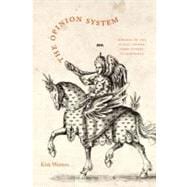
| Preface: The Opinion Machine | p. vii |
| Introduction and Overview | p. 1 |
| Fama and Fatum in Virgil's Aeneid | p. 16 |
| Manifestations of the Public Sphere in Christoph Martin Wieland | p. 24 |
| Nomos, Gnomae (the Council of War) | p. 61 |
| Representation and Opinion (Koselleck, Habermas, Derrida) | p. 70 |
| Politics and Belief (The Parable of the Sower) | p. 115 |
| The Opinion System and the Re-Formation of the Individual (Hobbes, Locke, Mendelssohn, Fichte, and Goethe) | p. 123 |
| Polystrophon Gnoman (Pindar and Holderlin) | p. 179 |
| Lichtenberg's "Opinions-System" (Meinungen-System) | p. 188 |
| Afterword | p. 239 |
| Notes | p. 247 |
| Bibliography | p. 273 |
| Index | p. 285 |
| Table of Contents provided by Ingram. All Rights Reserved. |
The New copy of this book will include any supplemental materials advertised. Please check the title of the book to determine if it should include any access cards, study guides, lab manuals, CDs, etc.
The Used, Rental and eBook copies of this book are not guaranteed to include any supplemental materials. Typically, only the book itself is included. This is true even if the title states it includes any access cards, study guides, lab manuals, CDs, etc.